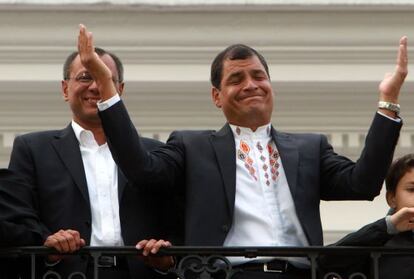Ecuador's Correa breezes to a third term
President pledges to continue to diversify his country's economy

Ecuador's Rafael Correa easily won a third term in Sunday's presidential elections, pledging to continue to diversify his country's economy while at the same time strengthening the alliance among Latin America's leftist leaders.
Correa, the 49-year-old US-trained economist, took nearly 59 percent of the vote, with his closest opponent, banker Guillermo Lasso, garnering 20 percent.
"Nobody can stop this revolution," said a jubilant Correa from the balcony of the presidential palace above a crowd of supporters in Quito. "The colonial powers are not in charge anymore, you can be sure that in this revolution it is Ecuadorians who are in charge," he added.
Since he was first elected in 2007, Correa has been able to capitalize on hefty earnings from Ecuador's state-run petroleum industry to increase government spending, including handing out millions of dollars to the nation's most needy. He now hopes to diversify the economy, hoping to attract investors who were scared off when his government defaulted on $3.2 billion in bonds in 2008.
"Our economy is one of the fastest growing, we also have the lowest unemployment rate, of 4.1 percent. But in spite of all these achievements, it would not be possible to tackle all the issues [in this term]. Poverty remains an acute problem, and so does unemployment and social inequality," Correa told Russia Today cable news network on Wednesday. He has said that he won't run for a fourth term.
Dictatorial accusations
The opposition has accused Correa of acting like a dictator. Last year, he won a judgment against the owners and a columnist from the Quito daily El Universo for suggesting that his brother has profited from the Correa administration. He pardoned El Universo but not before publicly chastising the press in general and announcing a new law to control the media.
In 2009 Correa reformed the Constitution to lift term limits for presidents. He easily won his second term after new elections were called after the altered Constitution was approved in a referendum.
During this new mandate, the president has promised to strengthen the ALBA group of leftist nations. Many analysts see him as a regional successor to Hugo Chávez who is still battling health problems and may not be able to serve out his term as president of Venezuela. But the Ecuadorian leader rejected this notion.
"Nobody is striving for the headship here. Hugo Chávez is a born leader, and there's no competition in trying to upstage the others. Nobody thinks 'I'll be the next leader. But if Hugo keeps the post, I'll become the deputy leader.' This is not our situation - our goal is to serve our people," he said on Russia Today.
Tu suscripción se está usando en otro dispositivo
¿Quieres añadir otro usuario a tu suscripción?
Si continúas leyendo en este dispositivo, no se podrá leer en el otro.
FlechaTu suscripción se está usando en otro dispositivo y solo puedes acceder a EL PAÍS desde un dispositivo a la vez.
Si quieres compartir tu cuenta, cambia tu suscripción a la modalidad Premium, así podrás añadir otro usuario. Cada uno accederá con su propia cuenta de email, lo que os permitirá personalizar vuestra experiencia en EL PAÍS.
¿Tienes una suscripción de empresa? Accede aquí para contratar más cuentas.
En el caso de no saber quién está usando tu cuenta, te recomendamos cambiar tu contraseña aquí.
Si decides continuar compartiendo tu cuenta, este mensaje se mostrará en tu dispositivo y en el de la otra persona que está usando tu cuenta de forma indefinida, afectando a tu experiencia de lectura. Puedes consultar aquí los términos y condiciones de la suscripción digital.








































